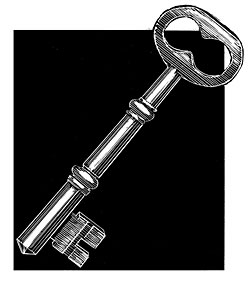For the Record
Feynman's key
By Ethan Dmitrovsky, M.D.
Discoveries in molecular biology over the past few decades were expected to cause unprecedented advances in biology and medicine. These advances are now being realized. Basic scientific insights have led to global health benefits, such as the engineering of "golden rice." This involves the insertion of the provitamin A biosynthesis pathway into the rice genome, with the aim of treating vitamin A de- ficiency worldwide. Scientific insights have also helped to unravel the genetic causes of certain leukemias, leading to the development of successful targeted therapies and dramatic clinical benefits. We are on the verge of a fundamental shift in medicine, where the causes and not just the symptoms of diseases can be treated. This will change medicine's mission from palliation to cure. It is one of the benefits of living in the post-genomic era.

|
|
Richard Feynman was saying that he thought the key to science
was provided without any handbook about its use. In a sense,
the humanities provide instructions for the use of this key. |
Dartmouth's medical school and academic medical center, as well as the broader Dartmouth College community, are active participants in this life-science revolution. Unanticipated scientific advances have led to a basic change in the conduct of science. While past scientific discoveries largely depended on the work of individuals, future discoveries will occur through the efforts of interdisciplinary teams. This is where Dartmouth has a competitive advantage, because of our collaborative academic environment and lack of institutional barriers. Dartmouth has evolved to a point where we can readily adapt to changes in the conduct of science. Our challenge now is to capitalize on this adaptation.
Union: One way to accomplish this is through exciting plans for a new life sciences building. There is a need to replace our aged scientific facilities. Yet, there are other compelling reasons for this construction. Discussions about this new facility have not conveyed fully what will make our life sciences building unique while simultaneously differentiating Dartmouth from peer institutions. This fact is evident in who will occupy this building. It will be a shared facility for faculty from the College and the Medical School. Such a creative union has not been typically envisioned by other academic institutions.
There are considerable benefits that will derive from this coming together. It will unite educators and scientists versed in basic mechanisms of cellular growth, differentiation, and development. They will be receptive to the implications of their work for improving human health and combating disease. Because of this, the intellectual reach of the faculty will certainly extend far beyond Dartmouth's campus, since a deeper understanding of biology will enhance public health.
There will be other benefits, too. This facility will not only promote current areas of scholarship, it will also foster new areas that depend on synergistic interactions between fields. We should design into this life sciences building communal space to encourage such interactions. If we do, this facility will certainly attract to Dartmouth College and Dartmouth Medical School even more distinguished faculty who will add to the vibrancy of our academic community. They, in turn, will draw to Dartmouth even more accomplished students and postgraduate fellows because they will want to be part of this exciting cycle of growth in excellence of scholarship, teaching, and service. Once begun, this cycle will become self-sustaining.
Balance: By investing in a new life sciences building, some may wonder whether Dartmouth would create an academic imbalance. It could be argued that such a building would not sufficiently emphasize excellence in the humanities or social sciences, long-standing strengths of Dartmouth College. Should we invest in the sciences rather than the humanities? Perhaps the answer to this question is different than what might be anticipated. The humanities have as much to offer the life sciences as the life sciences have to share with the humanities. When we point to apparent differences between these disciplines, we should not forget what joins them. Discovery is a fundamental feature of human nature. It is a basic human drive. However, we do not know how best to nurture it.
To examine this concept further, let me refer to an extraordinary series of lectures held at the University of Washington in Seattle by Dr. Richard Feynman, a Nobel Prize-winning physicist. His lectures addressed the nature of science and human values. He began his lectures by discussing the role of science in society. He said that as a scientist who had worked on the Manhattan Project and helped to create the atom bomb, he was often asked about the destructive side of science. He reflected on this issue by referring to a famous Buddhist saying: "To every man is given the key to the gates of heaven. The same key opens the gates of hell."
Impact: By this analogy, Richard Feynman was saying that he thought the key to science was provided without any handbook about its use. The humanities can serve as a guide by teaching us what it means to be human. In a sense, the humanities provide instructions for the use of this scientific key. Scientists who are versed in the humanities and social sciences are better trained to understand the impact of science on society. The physical and intellectual proximity of Dartmouth Medical School and Dartmouth College are major assets for both institutions. This is because Dartmouth is a place where we can explore the wise use of Richard Feynman's key.
"For the Record" (formerly titled "From the Dean") offers timely commentary from the dean of Dartmouth Medical School. Dmitrovsky is DMS's acting dean as well as the Andrew G. Wallace Professor and the chair of pharmacology and toxicology.
If you would like to offer any feedback about this article, we would welcome getting your comments at DartMed@Dartmouth.edu.
